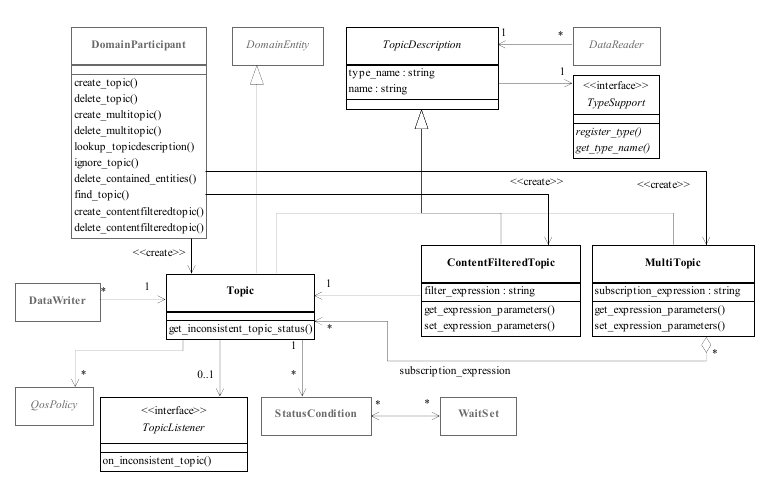 |
OpenSplice ISO C++ 2 DCPS
v6.x
ISO C++ 2 OpenSplice Data Distribution Service Data-Centric Publish-Subscribe API
|
 |
OpenSplice ISO C++ 2 DCPS
v6.x
ISO C++ 2 OpenSplice Data Distribution Service Data-Centric Publish-Subscribe API
|

The Topic-Definition Module is comprised of the following classes:
TopicDescription represents the fact that both publications and subscriptions are tied to a single data-type. Its attribute type_name defines a unique resulting type for the publication or the subscription and therefore creates an implicit association with a TypeSupport. TopicDescription has also a name that allows it to be retrieved locally.
Topic is identified by its name, which must be unique in the whole Domain. In addition (by virtue of extending TopicDescription) it fully specifies the type of the data that can be communicated when publishing or subscribing to the Topic.
Topic is the only TopicDescription that can be used for publications and therefore associated to a DataWriter. All operations except for the base-class operations set_qos, get_qos, set_listener, get_listener, enable, and get_status_condition may return the value NOT_ENABLED.
| QoS | Brief |
|---|---|
| TOPIC_DATA | User data |
| DURABILITY | Expresses the lifetime of a sample |
| DURABILITY_SERVICE | Specifies the configuration of the durability service |
| DEADLINE | Sets the period in which a sample must be sent/received |
| LATENCY_BUDGET | Sets the maximum delay the sample is in transit |
| LIVELINESS | Set the method by which an instance is considered alive |
| OWNERSHIP | Specifies if the DataWriters is shared or exclusive |
| RELIABILITY | Set the required reliability of a DataReader/DataWriter pair, reliable or best effort |
| DESTINATION_ORDER | Controls the logical order of the samples by reception time-stamp or source time-stamp |
| HISTORY | Specify how many generations of the same instance to keep |
| RESOURCE_LIMITS | Specify the amount of resources the DataReader/DataWriter pair can consume |
| TRANSPORT_PRIORITY | A hint to the underlying transport for prioritization |
| LIFESPAN | Specifies the maximum duration of validity of the data written |
| QoS | Attribute | Value |
|---|---|---|
| TOPIC_DATA | value.length | 0 |
| DURABILITY | kind | VOLATILE |
| DURABILITY_SERVICE | service_cleanup_delay history_kind history_depth max_samples max_instances max_samples_per_instance | 0 KEEP_LAST 1 LENGTH_UNLIMITED LENGTH_UNLIMITED LENGTH_UNLIMITED |
| DEADLINE | period | DURATION_INFINITE |
| LATENCY_BUDGET | duration | 0 |
| LIVELINESS | kind lease_duration | AUTOMATIC DURATION_INFINITE |
| OWNERSHIP | kind | SHARED |
| RELIABILITY | kind max_blocking_time synchronous | BEST_EFFORT 100 ms FALSE |
| DESTINATION_ORDER | kind | BY_RECEPTION_TIMESTAMP |
| HISTORY | kind depth | KEEP_LAST 1 |
| RESOURCE_LIMITS | max_samples max_instances max_samples_per_instance | LENGTH_UNLIMITED LENGTH_UNLIMITED LENGTH_UNLIMITED |
| TRANSPORT_PRIORITY | value | 0 |
| LIFESPAN | duration | DURATION_INFINITE |
| Status | Brief |
|---|---|
| INCONSISTENT_TOPIC | Another topic exists with the same name but different characteristics |
| Listener | Brief |
|---|---|
| on_inconsistent_topic() | Another topic exists with the same name but different characteristics |
ContentFilteredTopic is a specialization of TopicDescription that allows for content-based subscriptions. ContentFilteredTopic describes a more sophisticated subscription that indicates the subscriber does not want to necessarily see all values of each instance published under the Topic. Rather, it wants to see only the values whose contents satisfy certain criteria. This class therefore can be used to request content-based subscriptions.
The selection of the content is done using the filter_expression with parameters expression_parameters: